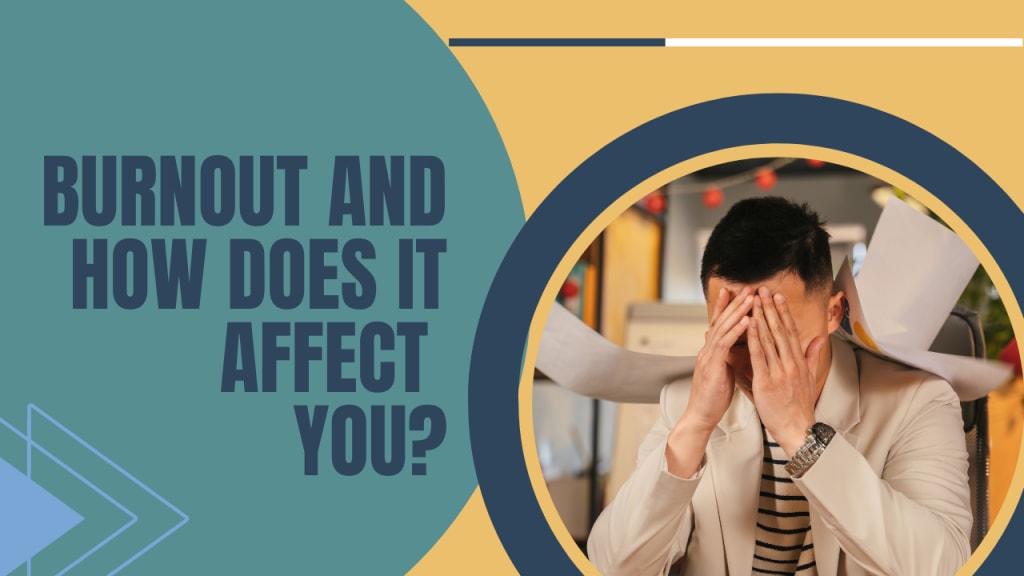What Is Burnout and How Does It Affect You?
Recognizing the Signs of Burnout: Exhaustion, Cynicism, and Reduced Efficacy

Understanding Burnout With Sarah
Meet Sarah, a hardworking and ambitious marketing manager who has been putting in long hours at work, taking on multiple projects and responsibilities. Over time, Sarah has noticed that she has been feeling increasingly exhausted, irritable and unmotivated. She struggles to concentrate, is forgetful and feels like she is constantly on edge.
What Sarah is experiencing is called Burnout.
So what exactly is Burnout?
Burnout is a state of emotional, mental, and physical exhaustion that results from prolonged and excessive stress. It is a response to a chronic workplace or personal stress that has not been effectively managed or addressed. Burnout is characterized by feelings of exhaustion, cynicism, and reduced professional efficacy. People experiencing burnout may feel overwhelmed, emotionally drained, and have a sense of detachment from their work or personal life. Burnout can have significant negative impacts on physical health, mental well-being, and job performance. If left unaddressed, burnout can lead to more serious conditions such as depression and anxiety.
Symptoms of a Burnout
The symptoms of burnout can vary from person to person, but there are several common signs that may indicate that you are experiencing burnout. These symptoms of burnout includes the following:
1.) Exhaustion: One of the primary symptoms of burnout is feeling physically, emotionally, and mentally drained. You may feel like you have no energy, even after a good night's sleep.
2.) Cynicism: You may begin to feel cynical or detached from your work, and may start to question whether your efforts are making a difference. This can lead to a lack of motivation and a reduced sense of accomplishment.
3.) Reduced performance: Burnout can also affect your performance at work or in other areas of your life. You may find it difficult to concentrate or complete tasks, and may feel like you are not functioning at your best.
4.) Physical symptoms: Burnout can also lead to physical symptoms, such as headaches, muscle pain, and changes in appetite or sleep patterns.
5.) Negative emotions: Burnout can also lead to feelings of anxiety, depression, or irritability. You may feel like you are on edge or easily overwhelmed.
6.) Social withdrawal: You may find yourself withdrawing from social activities and relationships, and may feel like you don't have the energy or desire to connect with others.
It is important to take these symptoms seriously and seek help if necessary.
How a Burnout Affects You?
Burnout can have a significant impact on your overall well-being. It can affect all aspects of a person's life, including their work, relationships, and overall well-being.
In the workplace, burnout can lead to decreased productivity, absenteeism, and job dissatisfaction. People who are experiencing burnout may struggle to concentrate, have difficulty making decisions, and experience a lack of motivation. Burnout can also lead to increased conflict with coworkers or supervisors, as well as a feeling of disengagement from work.
Outside of work, burnout can impact relationships with friends, family, and romantic partners. People who are experiencing burnout may withdraw from social activities and have difficulty engaging with others. They may also experience mood swings, irritability, and a general sense of negativity, which can put a strain on relationships.
Burnout can also have physical effects on a person's health. Chronic stress, which is often a precursor to burnout, has been linked to a range of health problems, including heart disease, high blood pressure, and a weakened immune system. People who are experiencing burnout may also have trouble sleeping, experience chronic fatigue, and have aches and pains.
In addition to the direct effects on a person's life, burnout can also lead to a sense of despair and hopelessness. People who are experiencing burnout may feel like they're stuck in an endless cycle of stress and exhaustion and may struggle to see a way out. This can lead to feelings of depression, anxiety, and even suicidal thoughts.
How to Deal With Burnout?
Dealing with burnout can be a challenging process, but it is possible to overcome and prevent it from happening in the future. When dealing with burnout, it's important to take a holistic approach that addresses all aspects of your life.
Taking a Break
When you're experiencing burnout, taking a break from work or other responsibilities can be incredibly helpful. This allows you to step back and recharge your batteries, which can help you come back feeling more refreshed and energized. It's important to take enough time off to truly relax and let go of stress.
Practicing Self-Care
Self-care activities like exercise, meditation, and spending time with loved ones can help reduce stress and boost your mood. Prioritizing self-care can also help prevent burnout from occurring in the first place. It's important to make self-care a regular part of your routine and not just something you do when you're feeling burned out.
Setting Boundaries
Establishing boundaries is crucial for preventing burnout. This means setting limits on your work hours, saying no to additional responsibilities, and making time for other things that are important to you. It's important to communicate your boundaries clearly to others and to stick to them.
Seeking support
Talking to friends, family, or a therapist can be a helpful way to process emotions and work through burnout. Support groups or professional counseling can also provide additional resources and strategies for managing burnout. Don't be afraid to reach out for help when you need it.
Reevaluating priorities
Burnout often happens when we're trying to do too much and not focusing on what's truly important. Taking time to reevaluate your priorities and goals can help you simplify your life and reduce stress. This may involve saying no to certain commitments or simplifying your daily routine.
Practicing Mindfulness
Mindfulness practices like meditation, deep breathing, and yoga can help reduce stress and promote relaxation. These practices can also help you stay present and focused, reducing feelings of overwhelm and burnout. Making mindfulness a regular part of your routine can help prevent burnout from occurring in the first place.
Making Changes
If burnout is the result of a toxic work environment or job, it may be necessary to make changes. This may involve seeking a new job, speaking to a supervisor about workload, or making changes to work processes to reduce stress. It's important to recognize when a situation is not serving you and take steps to make changes.
Burnout is a serious condition that can have a significant impact on a person's life. It's important to recognize the signs of burnout and take steps to address it before it becomes overwhelming. This may involve seeking help from a mental health professional, making changes to work or home life, and prioritizing self-care. With the right support and strategies, it's possible to overcome burnout and regain a sense of balance and well-being.
About the Creator
Dr. Jason Smith
I'm Dr. Jason Smith, and I have over 10 years of clinical experience as a highly experienced General Practitioner. My focus is on providing comprehensive medical care in preventive medicine, acute care, and chronic disease management.
Enjoyed the story? Support the Creator.
Subscribe for free to receive all their stories in your feed. You could also pledge your support or give them a one-off tip, letting them know you appreciate their work.






Comments
There are no comments for this story
Be the first to respond and start the conversation.